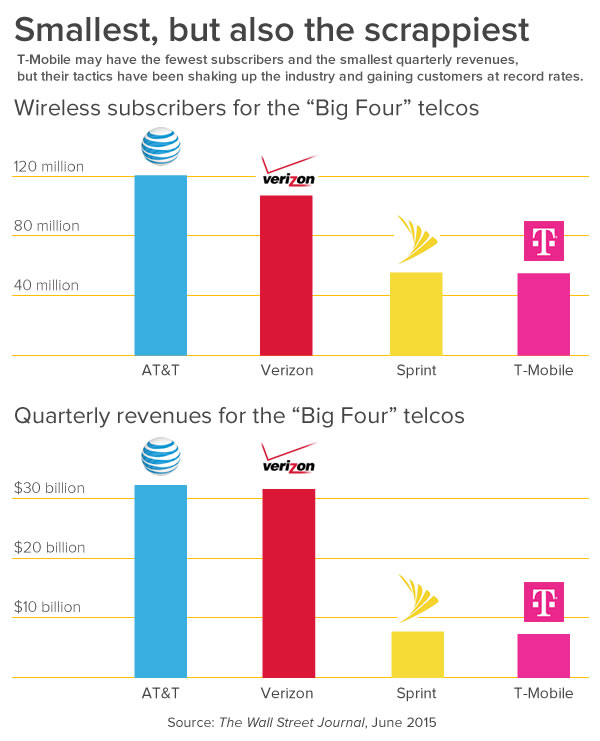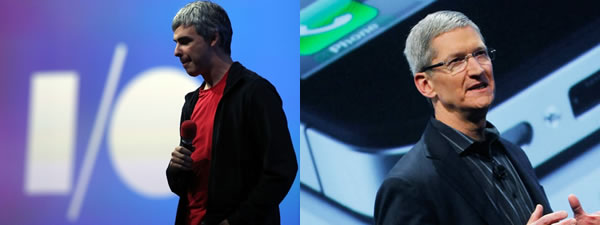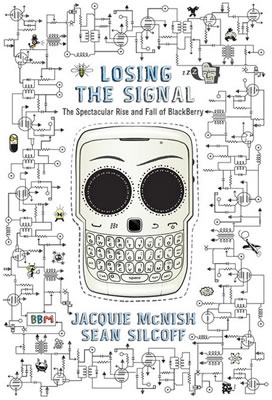T-Mobile and Dish Networks are discussing a merger

The Wall Street Journal reports that T-Mobile is in talks to merge with Dish Network, a deal in which T-Mobile CEO John Legere would be the CEO of the newly-combined organization. This move would offer the following benefits to each participant:
- T-Mobile would gain Dish Network’s billions of dollars of largely unused wireless licenses, giving it the ability to expand the capacity of its network.
- Dish Network would gain a solid broadband internet service, giving them access to the “second screen”, which broadcasters are relying on increasingly as their audience moves to the internet.
T-Mobile’s “Uncarrier” strategy, which has included data giveaways, price cuts, rollover offers, and the occasional CEO antics, has helped them grow their customer base at record rates, but they still remain the smallest of the “Big Four” mobile carriers. Dish Network’s wireless licenses, which were bought mostly as a gamble without any real plan for using them, would give T-Mobile the ability to expand their coverage and lure more customers away from its competitors.

In 2013, both Dish Network and T-Mobile’s parent company, the Japanese telecom Softbank, attempted to join with Sprint. This merger between the two one-time rivals mirrors the AT&T/DirecTV and the Charter Communications/Time Warner Cable deals, a fact that wasn’t lost on Ina Fried when she wrote “a deal between Dish and T-Mobile is akin to two people who hook up because they are the last ones left in the bar at closing time.”
If the deal goes through, T-Mobile could be well-positioned to take the number 3 slot from Sprint. Keep in mind that this isn’t a done deal, and it’s being made between two rather mercurial CEOs.
For more on the merger, see:
- The Wall Street Journal: Dish Network in Merger Talks With T-Mobile US
- re/code: A T-Mobile-Dish Deal Could be The Ultimate Marriage of Convenience
- TIME: T-Mobile and Dish Network Are Nearing a Merger, According to Reports
Losing the Signal: Interesting reading on the rise and fall of BlackBerry
In 2015, it’s all too easy to dismiss BlackBerry (or RIM, as they were originally named) as merely a casualty of the smartphone revolution, but to do so is to forget that they started that revolution in the first place. Before the iPhone and Android, there was the BlackBerry, the product brought to life by co-CEOs Mike Lazaridis, the electronics tinkerer who foresaw the possibilities that would come from merging computing and wireless technologies, and Jim Balsillie, the businessman with grand ambitions to become a figure like Bill Gates or Steve Jobs. It was the BlackBerry that tore email away from the desktop and put it in our pockets, got North American businesspeople hooked on text messaging, and introduced us to the habit of continually staring at a glowing screen in our palms.

Losing the Signal is a newly-released book written by Canadian reporters Jacquie McNish and Sean Silcoff that does far more than tell the story that most of us know about BlackBerry — their fall from being the must-have smartphone after the iPhone’s announcement and release in 2007. It tells the story of RIM’s early days and the challenges they overcame, from the limits of the technology and cellular networks of the time to how other companies tried to stifle them by withholding payments for orders. More importantly, it tells the stories of two very different co-CEOs, and of their partnership, both as friends and in business.
According to co-author Sean Silcoff, it took dozens of hours of personal interviews with Balsillie and Lazaridis at their homes to get them to “open up”; on one particular day, he followed a six-hour session with Balsillie by another five with Lazaridis. Their efforts paid off; Losing the Signal is a fascinating book that’s hard to put down; I’ve been getting my readings in during lunch, at the gym, and any time I can sneak in during the day. If you’re looking for a summer read that’s both substantive and fascinating, I highly recommend picking up Losing the Signal.
For more on Losing the Signal, see:
- Amazon.com: Losing the Signal: The Untold Story Behind the Extraordinary Rise and Spectacular Fall of BlackBerry
- The Globe and Mail: Losing the Signal: How BlackBerry’s bid to one-up the iPhone failed
- New York Times’ Bits: Behind the Downfall at BlackBerry
Coming soon: the next versions of Android and iOS

Summer is coming, and along with the warm weather and sunshine (well, we’re hoping they’re coming) are previews of the upcoming versions of Apple’s and Google’s mobile operating systems. Both OS vendors hold conferences for software developers around the beginning of summer; Google recently concluded their Google I/O conference, and Apple’s WWDC (Worldwide Developer Conference) will start on June 8th. These conferences are where both companies show sneak previews of their upcoming mobile OSs.
Android M made its first public appearance at Google I/O. According to Sundar Pincai, Google’s senior VP of products, this upcoming version of Android features a “back to basics” approach. While continuing with the visual aesthetic that premiered with Android L (better known as “Lollipop”), this upcoming version’s focus is more on usability and stability rather than flashy new features. Among the additions that you’ll find in Android M when it comes out (presumably later this year) are:
- An easier and better way for you to grant permissions to apps to access certain sensitive phone features such as your Contacts list, camera, microphone, and current location,
- an improved web experience with support for automatic sign-in, saved passwords, autofill, and other things we’ve grown accustomed to with our desktop browsers,
- support for fingerprint scanners, not just to unlock your phone, but also to make in-person and online purchases,
- mobile payments through Android Pay, Google’s answer to Apple Pay,
- better power management for improved battery life, and
- automatic backup of data for apps whose supporting data is 25 megabytes (that’s some pictures, but a lot of text) or smaller
We expect that iOS 9 will be announced at WWDC, as is their habit. Those of you who’ve been less than pleased with the problems that came with the upgrade from iOS 7 to iOS 8 will be happy to hear that a large part of the iOS 9 development effort is supposed to be about making the operating system more stable, optimized and reliable. As with Android, the upcoming version of iOS is less about adding flashy new features to draw in new customers and more about making the existing ones better in order to make their current user base happy. As with Android M, we expect that iOS 9 will see general release later this year.
For more on the upcoming versions of Android and iOS, see:
- Android Pit: Android M has arrived: here’s what you need to know
- MacWorld: Podcast: Unpacking Google I/O and making WWDC predictions and How to watch WWDC 2015 keynote livestream, and the Apple announcements to expect: Apple TV, Macs, Beats Music, iOS 9, OS X 10.11
- Ars Technica: iOS, OS X, music, Swift, and more: What you should know before WWDC next week


